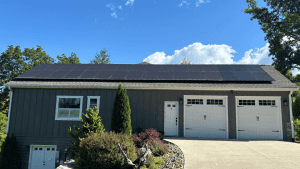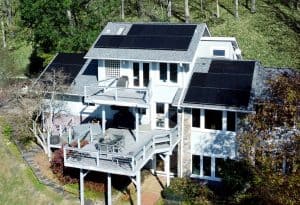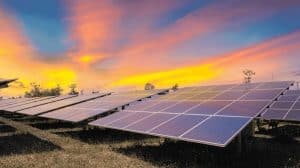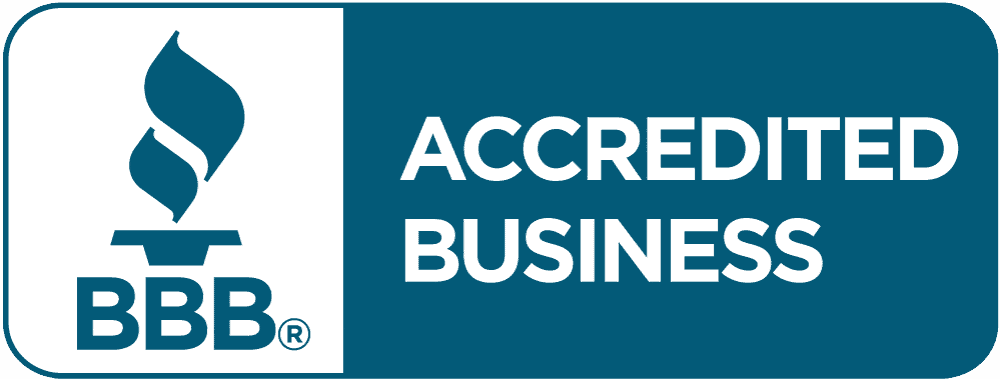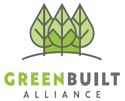Does Solar Increase Home Value?
Written by Rachel Vergara
Raising the value on your home will take many home renovations, but will a solar system installation be on your to-do list of home improvements to raise your home value? Let’s find out!
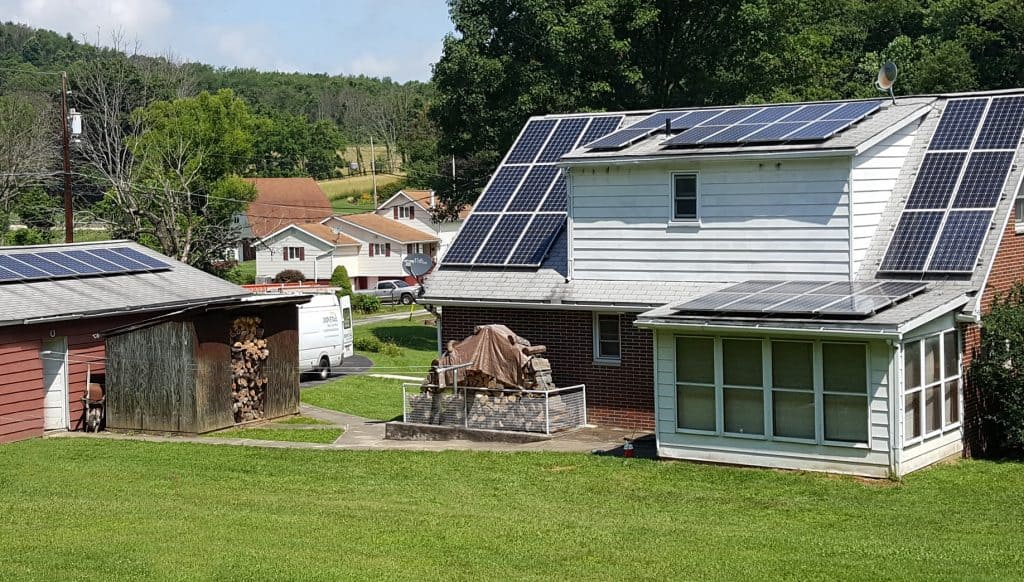
How Much Does Solar Increase A Home's Value?
As solar has become more accessible to homeowners, more information and data has arisen to give insight on whether or not solar actually increases home value.
Let's take a look Nationally
According to a study done by Zillow, “homes with solar-energy systems sold for 4.1% more on average than comparable homes without solar power. For the median-valued home, that translates to an additional $9,274.” This is just an average percentage. Some homes will sell for more, upward towards 5.4% in New York, as well as a low of 2.7% in some parts of California. No matter the percentage, studies have shown that there are increases to a home’s value when solar has been installed.
When buying a new home, potential buyers are drawn to the future energy savings that come with solar. Homeowners who consume a lot of power are more willing to pay more up front for a home with solar knowing they will save down the line. This goes for those who are willing to pay more upfront for a home with solar in order to save money on their future electricity bills.
In Asheville, Solar Pays for itself
Now let’s look locally here in Western North Carolina. We reached out locally to the Owner at Mosaic Community Lifestyle Realty here in Asheville, Mike Figura, to get an insight on how solar affects the value of the home. From his experience, he says “Solar panels increase a home’s value by making the home more cost efficient to operate. [A home’s value] is dependent on fluctuating real estate market conditions, energy costs, and the size, quality and age of the solar system” in regards to how solar affects the value of the home. He goes on to quote from the web, “The National Renewable Energy Laboratory offers a useful guide when determining how much your property’s value will go up. According to its research, each additional $1 in energy bill savings (from your solar installation) adds $20 to your home’s total value.”
When asked if people are interested in buying homes with solar already installed, he gave the simple answer: Yes. “People want to know if solar panels are leased or owned, the age and output of the system, and how much energy and money it saved them each year.”
Interested in what more Mosaic Realty can offer?
For more information on Mosaic Community Lifestyle Realty check out their website below!
More Efficient Solar Panels Add More Value to Your Home
The influence Solar Panels have on home value is based on how much money is saved on annual utility bills. A study done in the Appraisal Journal titled “Journal Evidence of Rational Market Valuations for Home Energy Efficiency” states “the selling price of homes increased by $20.73 fir every $1 decrease in annual fuel bills” The efficiency of your solar array directly correlates to the increase in your home’s value, so careful consideration of the type of solar system being installed is necessary. Here’s a breakdown of the different types of solar cells.
Monocrystalline
Solar cells in a monocrystalline system are cut from a single crystalline silicon ingot. As a result of using one piece of silicon, monocrystalline are the most efficient of the two silicon panels, averaging 18-22% efficiency. With such a high efficiency rate, this is usually the best option for homes because less panels are used. Higher costs of production will result in the buyer paying more.
Polycrystalline
Polycrystalline solar systems are made up of multiple pieces of crystalline silicon ingot. Polycrystalline average 15-17% efficiency rate which is lower than its counterpart due to how electrons move through a multiple silicon cell system. Lower efficiency panels require more panels per home, an average of 60 panels for a normal sized house. Poly solar panels are cheaper than monocrystalline systems.
Thin-film Solar Panels
Thin-film solar panels are thin layers of photovoltaic material on glass, plastic, or metal. This means that thin-film solar panels are cheaper to manufacture and therefore cheaper for the customer. Thin-film solar panels are the least efficient at 10-13% and homes need more panels in order to support their energy usage. This ultimately requires more roof space and is not ideal for homes.
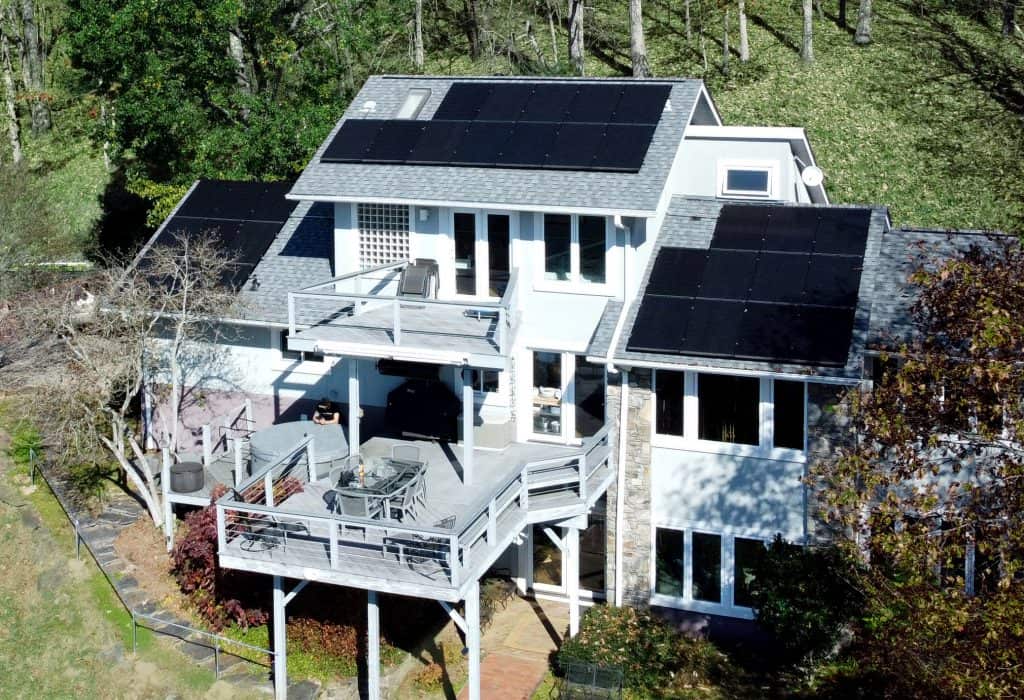
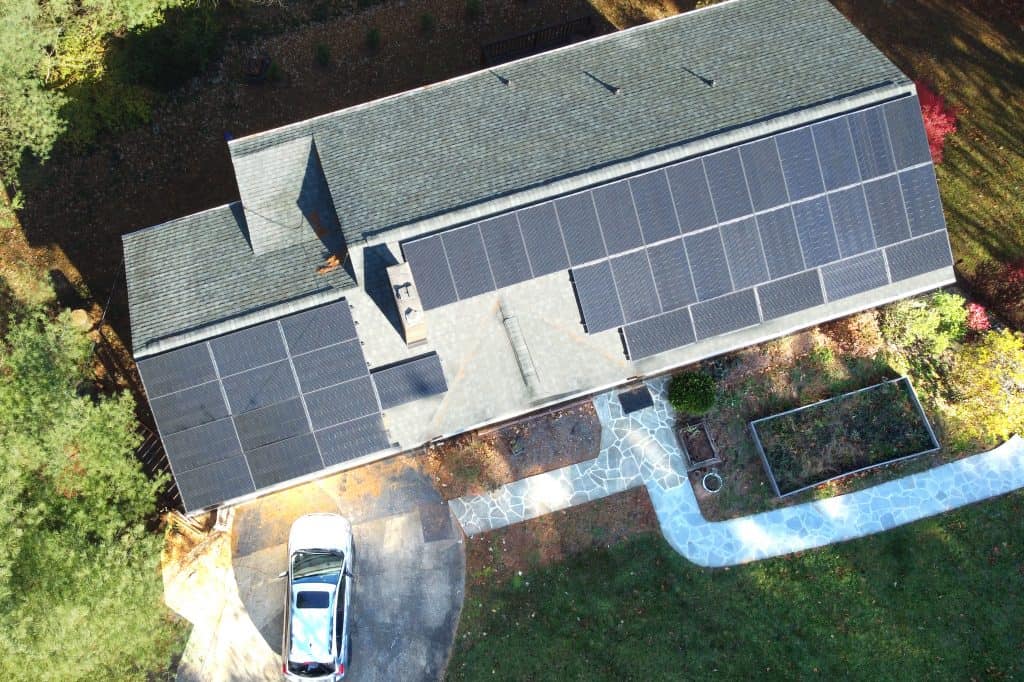
Setup: Grid Tied Solar or Off the Grid?
At this moment, there isn’t enough data on the correlation between the value of a home and the setup of the solar system. Most data comes from grid-tied systems. However, we can speculate that homes will sell faster based on which type of solar setup is preferred by the home buyer.
Here are some benefits and disadvantages of each type of solar setup.
Grid-Tied Solar
Grid-tied systems are solar systems that are connected to the utility grid and send excess energy back to the local power grid. Grid-connected systems are the most common type of setup as they are usually less expensive than other types of setups. They are cheaper to install and require less equipment, such as batteries.
Being connected to the grid will have its disadvantages. If the power grid were to go down, homes with a grid-tied system will shut down and unable to produce electricity. When there is no sunlight or at night-time, there is no solar energy being produced.
Off-grid Solar Systems
Off-grid solar systems are completely independent from local power grids. Solar panels generate energy that is stored in batteries to be used on a cloudy day or at night. Remote areas that are far away from the grid may benefit from using an off-grid system, especially if running a powerline is too expensive. Some people desire self-sustainability and the independence of being off the grid, therefore a grid-tied is preferred over other types of system.
With the addition of equipment, that includes batteries, charge controller, power-conditioning equipment, safety equipment, meters, and instrumentation, off-grid systems can get costly. Batteries also take up space unlike grid-tied systems that use unoccupied space in the home and require more regular maintenance.
Hybrid Solar Power Systems
Hybrid solar panels combine a mixture of both grid-ties and off-grid systems. A hybrid system is still connected to the grid but stores excess energy in a battery to use at a later time. Energy generated from the sun goes to an inverter and from there it goes to either your home, a battery, or the local power grid. Hybrid systems allow for better management of consumption of grid based power while also being a great backup power supply. Because it’s still tied to the grid, hybrid systems require less batteries which is ultimately more affordable than off-grid systems but more expensive than grid-tied systems due to the extra equipment. The capacity of the hybrid inverter can impact the number of appliances you can use at the same time, causing issues that may be avoided with other systems.
The Best Type of Solar Installation to Get to Increase Home Value
The value increase of your home is dependent on the type of system installed and its efficiency. Although larger installations may bring more value to a home, this is not always the case. The efficiency of the array is not dependent on how large the system is, it’s dependent on how efficient the panels themselves are. As discussed before, the most efficient solar panels are the Monocrystalline Silicon Panels. Though pricier upfront, the energy efficiency will save more money over time compared to other solar cells. Because of its high efficiency rating, owning monocrystalline solar cells will increase your home’s value when you are ready to sell.
As for the setup of the system, there isn’t enough information on whether or not the setup of the solar system affects the home’s value. It really depends on the preferences of the potential buyer. Off the grid systems are more desirable to those who are interested in becoming independent from the grid. It is more expensive than a grid-tied system due to more equipment being installed. On the other hand, grid-tied systems are more desirable to those who do not want to put a large amount of money down right away.
Something to keep in mind when selling and buying homes with solar is to pay attention to the warranties attached to this system. If you bought solar 15 years ago, and the warranty on the system only lasts 20 years, it’s hard to justify increasing the value on the home based on solar if there is only 5 years left on its warranty. Although a solar system usually lasts longer than the warranty period, it may be tough on the buyer’s wallet when it comes to maintenance and repairs if the warranty runs out.
Want more info on product warranties and production guarantees? Check out our post here.
Sources
- The Appraisal Journal “Evidence of Rational Market Valuations for Home Energy Efficiency”
- Mosaic Community Lifestyle Realty
- Zillow
- CNBC
Related Posts
Adding Solar to Your Home: How it boosts and Impacts Appraisal
In recent years, the adoption of solar energy systems has surged, not only for their environmental benefits but also for the financial advantages they bring...
Read MoreUnderstanding the North Carolina Bridge Rate Structure
Introduction:The North Carolina Residential Renewable Energy Program is a unique opportunity for residential customers to harness renewable energy for their own use. In this blog...
Read MoreHow Virtual Power Plants Could Be the Key to Saving Rooftop Solar
How Virtual Power Plants could be the Key to Saving Rooftop Solar The Rise of Virtual Power Plants This approach is known as a virtual...
Read MoreMaximize Savings & Sustainability with PowerPair from Duke Energy Progress & Duke Energy Carolinas
Maximize Savings & Sustainability with PowerPair from Duke Energy Progress & Duke Energy Carolinas Duke Energy Progress & Carolinas is offering an enticing opportunity for...
Read More